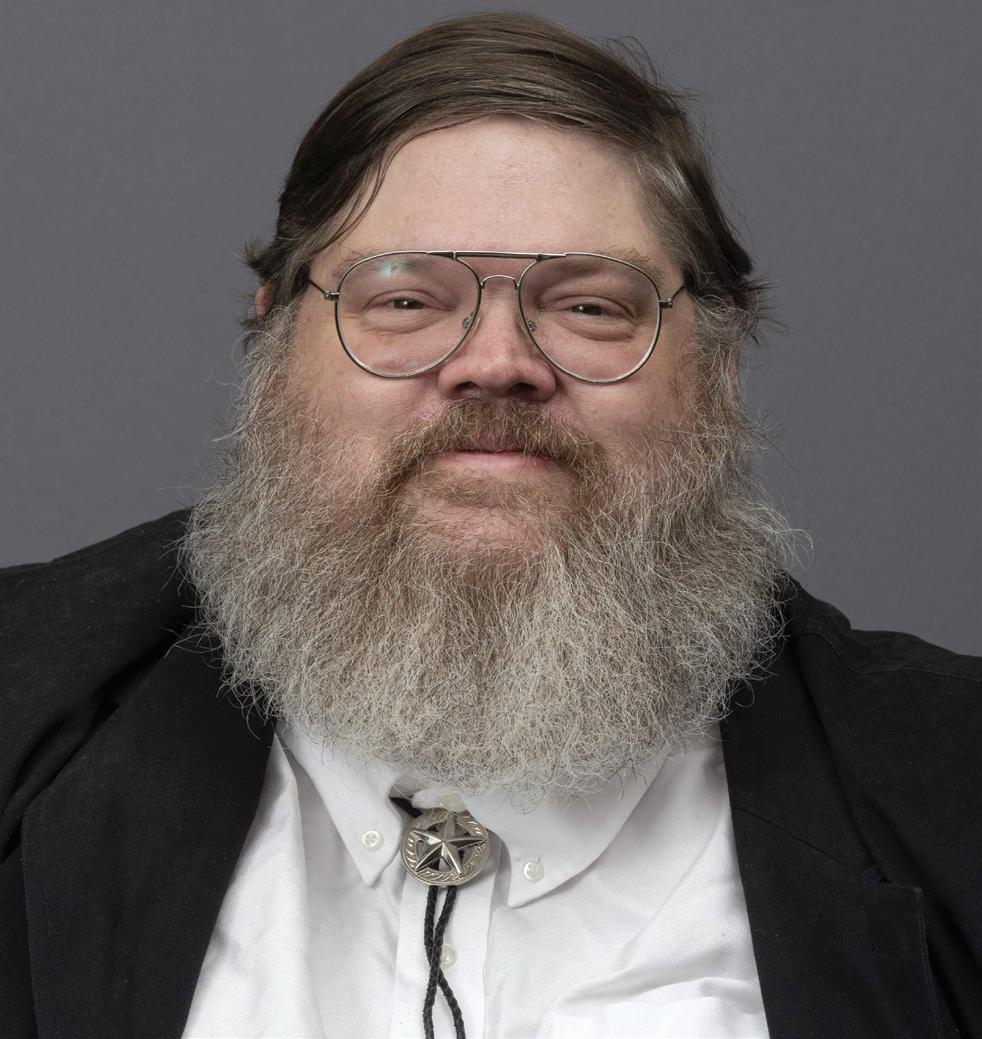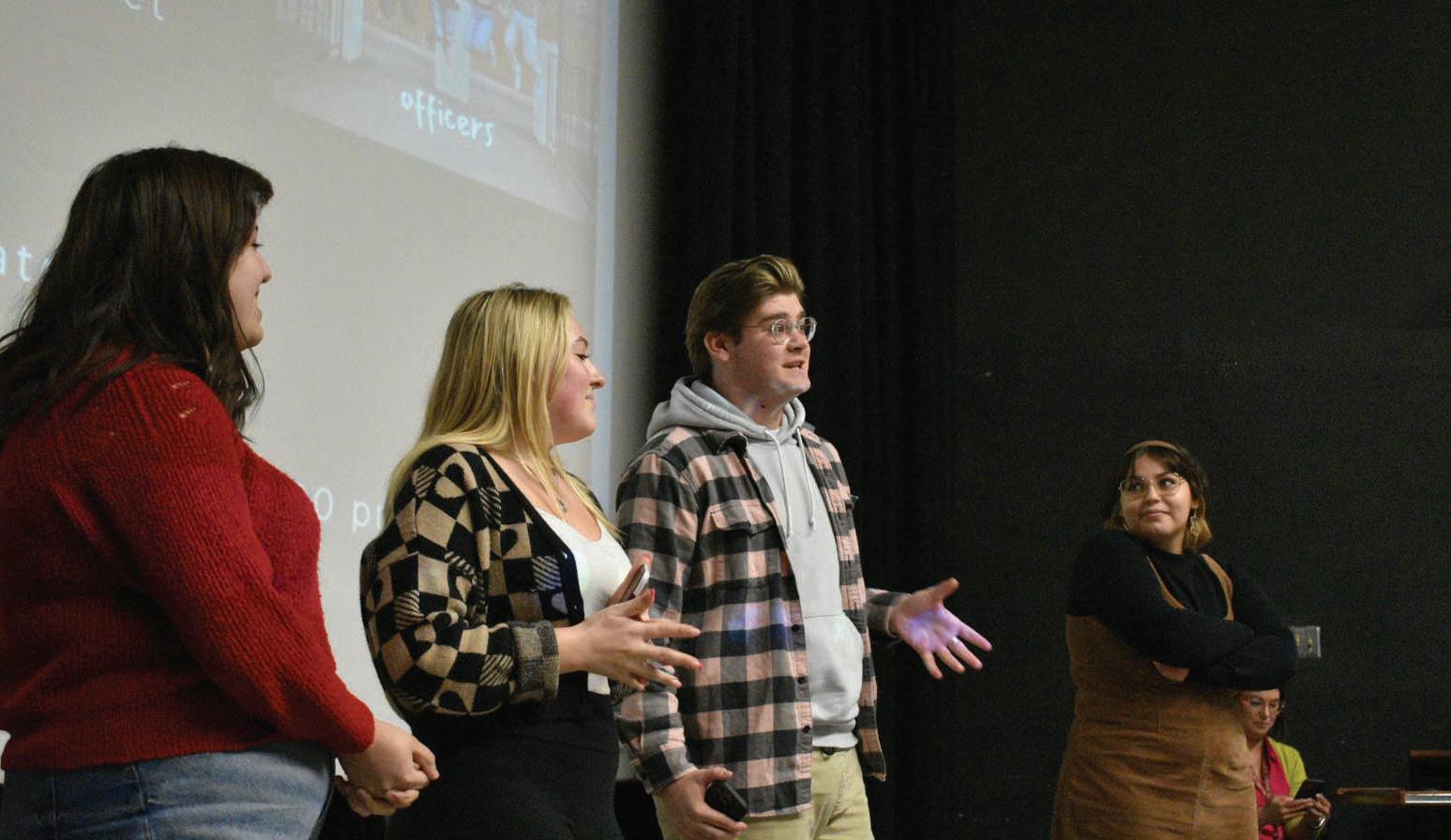
9 minute read
LIFE & ARTS Remembering William Stapleton
from 02-21-23
Ben Middleton Life and Arts Reporter
Room 2209 of Bruce and Gloria Ingram Hall is not a conventional office. Miscellaneous electronics are stacked to the ceiling and half-finished projects and books cover any available desk space. For nearly a month this room has laid dormant. Students no longer fill the space to ask their questions and the smiling face of professor William Stapleton no longer occupies the room.
Advertisement
Stapleton, a professor of the Texas State Ingram School of Engineering, died of an unexpected heart attack on Jan. 16, leaving a void in the classrooms and offices of Bruce and Gloria Ingram Hall and in the hearts of the students and colleagues who knew him.
Stapleton had a massive influence on the culture of the Ingram School of Engineering, teaching several electrical engineering and computer engineering classes and playing an important role in developing and accrediting the degrees offered by the college.
Harold Stern, a professor in the electrical engineering program and Stapleton's colleague, said without Stapleton, the computer engineering degree would not exist and Texas State would be significantly weaker without his contributions.
“He was a very optimistic individual and basically helped form a student-centered culture,” Stern said. “A lot of what you see in electrical engineering is part of the culture that he developed and that spreads throughout the school.”
Stapleton grew up in Tuscaloosa, Alabama, where his father taught electrical engineering at the University of Alabama. His father’s career inspired Stapleton to also become an electrical engineering professor. Stapleton received his bachelor's, master's and doctorate degrees in electrical engineering from the University of Alabama where he taught until 2007 when he left to teach at the Texas State Ingram School of Engineering.
From Front Theater
Stapleton had osteomyelitis in his lower legs, making it necessary for him to use a wheelchair, which he never let slow him down. He was known to always be on time and to always be able to help his colleagues and students with whatever they needed. He once requested to use a lab space to do maintenance on his wheelchair so he didn't need to take the day off.
program in 2011 and his guidance influenced the way that the faculty have written every accreditation paper since then. His name is also well-known throughout the civil engineering program where he helped in the hiring process and played a crucial role in upholding the standards of the Ingram School of Engineering.
“In a lot of ways he helped us establish our own identity,” Stern said. “He helped us basically stand our ground and develop and be much stronger, much quicker than what you would expect in a new organization.”
Outside of his career, Stapleton loved concerts and visiting his family in Alabama. He also loved to travel to national parks and historical sites. He would send photos of his adventures to his colleagues, who said they would feel like they were there with him.
He would often invite colleagues to get food or drinks after work and would plan social events and mixers with the other professors to ensure that they were connected. With Stapleton's kind and outgoing personality, he turned his coworkers into his friends.
“He was a born teacher, and a born friend,” Stern said.
Stapleton’s biggest contribution to the Ingram School of Engineering was his kind and positive attitude. He was known most for his smile and how he would always be genuinely interested in his colleagues' lives. His office was consistently full of students asking for advice, even those who were not enrolled in the classes he taught. He was known to be patient and take the time to answer every student's concerns.
“I want to say that I think he was the most punctual professor I have seen in this university,” Clara Novoa, professor and industrial engineering program coordinator, said. “One semester I was teaching, and he was teaching after me. My class was ending at 9:50 and at 9:40 he was ready in front of the door.”
Stapleton published many scholarly works researching sensors, computer architecture, embedded systems and more. He was a member of the Institute of Electrical and Electronics Engineers (IEEE) and received an IEEE best paper award in 2009. In 2014, he was awarded the Texas State Presidential Award for Excellence in Teaching for his accomplishments.
Stapleton's time at the University of Alabama made him a great accreditation consultant for the Ingram School of Engineering. He wrote the reports for the accreditation of the manufacturing engineering
“We are the only production company that will take full original student work and go out and do the full thing,” Anthony Lopez, a performance and production sophomore and publicist for COSMO said. “We won’t just do a writer’s workshop or a stage reading for them. Despite having this rugged but approachable atmosphere about us, we still kind of keep the same system that everyone else has without that kind of chip on our shoulder. This is for fun but you’re going to come here and do some theater because this is what we love and we’re going to do it right.”
“When I told the students [of Stapleton's death] some cried, and that shows us his impact and what we are missing,” Semih Aslan, the electrical engineering program coordinator said. “I will be sorry for the future students that aren't going to be able to know him.”
Although it saddened Breda to turn people away, it gave her great hope for the organization's future, especially with how quickly the troupe grew from about seven members to 40 within a year.
“We had a bunch of plays that were submitted to put on their own work,” Breda said. “It got to the point, which was exciting for us but kind of sad because of what we made COSMO for, where we had to instead of making our own yes, we had to, unfortunately, tell people no, which is sad but also exciting because of how many more people we’ve gotten. It has just been very exciting to see how much COSMO has grown over the past year.”
In the future, although the original members will have graduated, Ruibal hopes that the remaining students carry on the legacy. Currently, the troupe is considering expanding the COSMO Theatre Troupe outside of Texas State. Ruibal hopes with the passion that the current troupe has for theatre, that idea can be accomplished.
“For us, you can tell that this is something that we love to do,” Ruibal said. “This is something we did on our own. I think that’s why we have so much fun with it because this is us.”
To learn more about the COSMO Theatre Troupe, visit its Instagram @ cosmotheatretroupe.
COSMO has produced three shows since its creation last spring and is looking forward to three upcoming performances this semester, including a 10-Minute Play Festival.

Kairi Galvan, a film sophomore and secretary for COSMO, believes that the organization provides a more secure opportunity to perform compared to other performing arts organizations that are exclusive and have a slim acceptance rate. Galvan and Lopez believe the organization's approachable image and members' love for theater are what makes it special.
The inspiration to start performing wasn’t always the first choice for some of the members of COSMO. Zachary Powell, a film concentration sophomore and treasurer for COSMO, wanted to be involved in sports at a young age, but couldn’t due to a medical condition. His mom put him in theater at the age of five, and ever since, Powell has been grateful.
Powell is working on his first show “Murder at the Manor,” set to take the stage on April 14. Shows like "Murder at the Manor" typically start with table reads at Alkek Library and about two to four weekly rehearsals for a couple of months at the Theatre Center to ensure the shows are a hit. He believes that through this show, he is already discovering a new love for directing and taking charge.
“Just working with these people has taught me a lot about myself and how I like to work with others and make something that is special for other people to see,” Powell said. “That’s all I love doing. I want to make something that people can smile at, laugh at or just feel something and I feel like I’ll be able to take this experience with me if nothing else to whatever I go to next and be able to create something that people can enjoy.”w
COSMO has grown exponentially since it started. Shelby Breda, a performance and production sophomore and vice president of COSMO saw an influx of interest when the 10-Minute Play Festival was announced. The 10-Minute Play Festival will consist of a featured play created by Ruibal and six competing plays written by Texas State students that will compete to win a $50 Visa gift card.
Interested students submitted their plays and only a limited number of them were selected to be performed on Feb. 25 at the Theatre Centre.
Opinions in The University Star are not necessarily those of our entire publication, Texas State University’s administration, Board of Regents, School of Journalism and Mass Communication or Student Publications Board.

During the Nov. 2022 midterm elections, only half of the 36 Texas public universities had a polling location and just two of the nine historically Black colleges and universities had them, according to the Texas Tribune. Despite registration for voters between 18-24 being 19% higher in 2022 than it was in 2018, this demographic still had the lowest turnout in Texas.
On Election Day at the LBJ Student Center, the wait time for voting exceeded one hour. In fact, even though polling locations closed at 7 p.m., students were still in line voting until past 9 p.m. If this bill is passed, it eliminates the possibility of voting access to some students, especially those who live on campus and/or do not have a reliable form of transportation to get to a different polling location.
The University Star's news team was out covering Election Day for hours in November and saw how long the lines at LBJ were. Reporters spoke to the students who stood in line, determined to cast their vote, and shared the interviews, photos and videos with our followers on social media. As student journalists, our job is to accurately report on our communities. If our campus community's most important polling place is removed, our responsibility to serve and deliver the truth to our audience will become more difficult to meet. In the fall of 2022, Texas State welcomed a record-breaking freshman class. If the university plans to continue accepting that amount of students and increase enrollment, on-campus polling locations are crucial to accommodate a growing number of students.
Entertainment
Additionally, if all of these students have to find other polling locations, it can overwhelm other locations.
According to The Texas Politics Project, only 32.4% of traditionally college-aged students vote. In times when it’s increasingly important that a young voice be heard in the political world, this bill would make an already low demographic of voters even more discouraged.
This bill also limits the sense of community surrounding politics on campus. On Election Day, students, politicians and organizations alike were able to voice their opinions on policies and candidates in the election. If polling locations are banned on campus, who’s to say that these practices won’t be banned too?
According to the Campus Vote Project, millennials and Gen Z were the largest shares of eligible voters in 2020 but with low voter turnout, it's hard to see their impact. Taking away these sites on college campuses will only cause the numbers to continue decreasing.
It’s not just students who are using college campus polls. Citizens who live in the area of the college campuses, and who don’t want to travel far could also be affected by the bill. The convenience of college campus polls allows not just students but citizens to vote. Removing polls on college campuses excludes an entire group of locals who depend on the campus location to cast their vote.
A study from the American Economic Association found that a one-mile increase in distance to a polling location reduced voter turnout from districts with minority residents by 19%. Meanwhile, for predominantly white communities, voter turnout decreased by only 5%.
If the state of Texas wants a voter turnout that is more representative of its population, it would make it easier for the part of the population that is actively shaping its future. Voters under 30 increased from 8% in 2014 to almost 26% in 2018, which is still much lower than the overall turnout of 53%, according to the Tribune. We are only continuing to make progress as more and more young people are allowed to register each election cycle.

Many students are new to voting which can make it scary to participate in elections. Having polling places on college campuses gives students an opportunity to vote in an environment that they’re comfortable in.
Rather than having to inevitably spend thousands of dollars on buses to get students to voting locations, the state legislature should do the right thing and expand access to voting through more locations and take away restrictions on early voting and voter ID laws.
HB 2390 is just one of likely more than 7,000 bills that will be filed this legislative session and only around a thousand will pass, according to the Tribune. The bill passing through the Republican-held Texas legislature which has filed more than 200 votingrelated bills aimed at election integrity would be a failure in achieving the integrity they desire.





